#日本語勉強
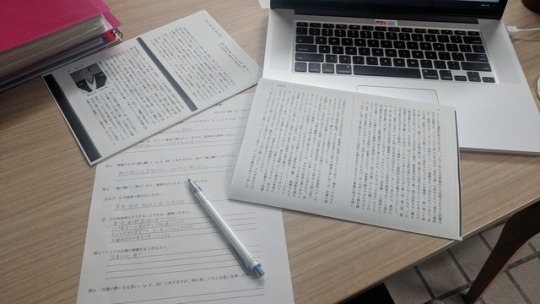
2019/02/04
- Got bread from the bakery on their last day
- Finally got a Japanese phone number
- Somehow I survived about a year without one
- Finished classical Japanese homework
- If you want funny anecdotes about a sassy Japanese noblewoman, 清少納言’s (Seisho Nagon) 枕草子 (The Pillow Book) is the read for you
- Finished 漢文 (Kanbun) homework
- Confucius does indeed say
- Finished reading homework (pic related)
- Planned out a trip to the capital
- Ya boi’s gettin that Bullet Train magic
2019/01/26
History, it’s always history. History class keeps me hopeful for the future. One day kids will just learn about things we can’t even comprehend yet.
終章 - The final chapter
辿る - たどる to follow (road), to pursue (course), to follow up
めく - to show signs of
テーゼ - thesis; statement
啓蒙主義 - けいもうしゅぎ; illuminism, enlightenment
連携 - れんけい cooperation; coordination; link
文明 - civilisation; Bunmei era
万能 - ばんのう all-purpose, almighty, omnipotent
打撃 - だげき 1. blow, shock, strike, damage, 2. batting (baseball)
終焉 - しゅうえん demise
かげり - shadow or cloud over one’s happiness
思潮 - しちょう;trend of thought
皇国 - The Japanese empire
史観 - historical view
抵触 - ていしょく conflict (with the law)
丹念 - たんねん diligence, application
実証主義 - じっしょうしゅぎ positivism
排外主義 - はいがいしゅぎ; anti-foreign
対外 - たいがい external/foreign
侵略 - しんりゃく aggression; invasion; raid
依拠 - いきょ dependence
様相 - ようそう aspect
化身 - けしん incarnation; impersonation; personification; avatar
為政者 - いせいしゃ statesman
蔓延る - はびこる to spread; to run rampant; to grow thick; to become powerful
権化 - ごんげ incarnation; avatar
疑念 - ぎねん;doubt
脱構築 - だつこうちく deconstruction (Jacques Derrida)
助長 - じょちょう;promotion
蠢く - うごめく; to wriggle; to squirm; to crawl like a worm
ユダヤ - Judea
従軍慰安婦 - じゅうぐんいあんふ;comfort women
先述 - せんじゅつ The aforementioned / above-mentioned
実証 - じっしょう actual proof; demonstration
担保 - たんぽ security; collateral (mortgage)
君臨 - くんりん;reigning, controlling, to reign, to dictate, to control
趣向 - しゅこう a device; a plan, an idea
新機軸 - しんきじく;innovation; new departure; milestone; breakthrough
隠蔽 - いんぺい concealment; suppression; hiding
白日 - bright sunshine; broad daylight
嶋 - island [alternate]; territory of an organised crime gang
力作 - りきさく; literary or artistic masterpiece (on which much labour was spent) (labor)
自虐 - masochism
侵撃 - しんげき; invading and attacking
真摯 - しんし;Sincere/Earnest
紛争 - ふんそう dispute, trouble, strife
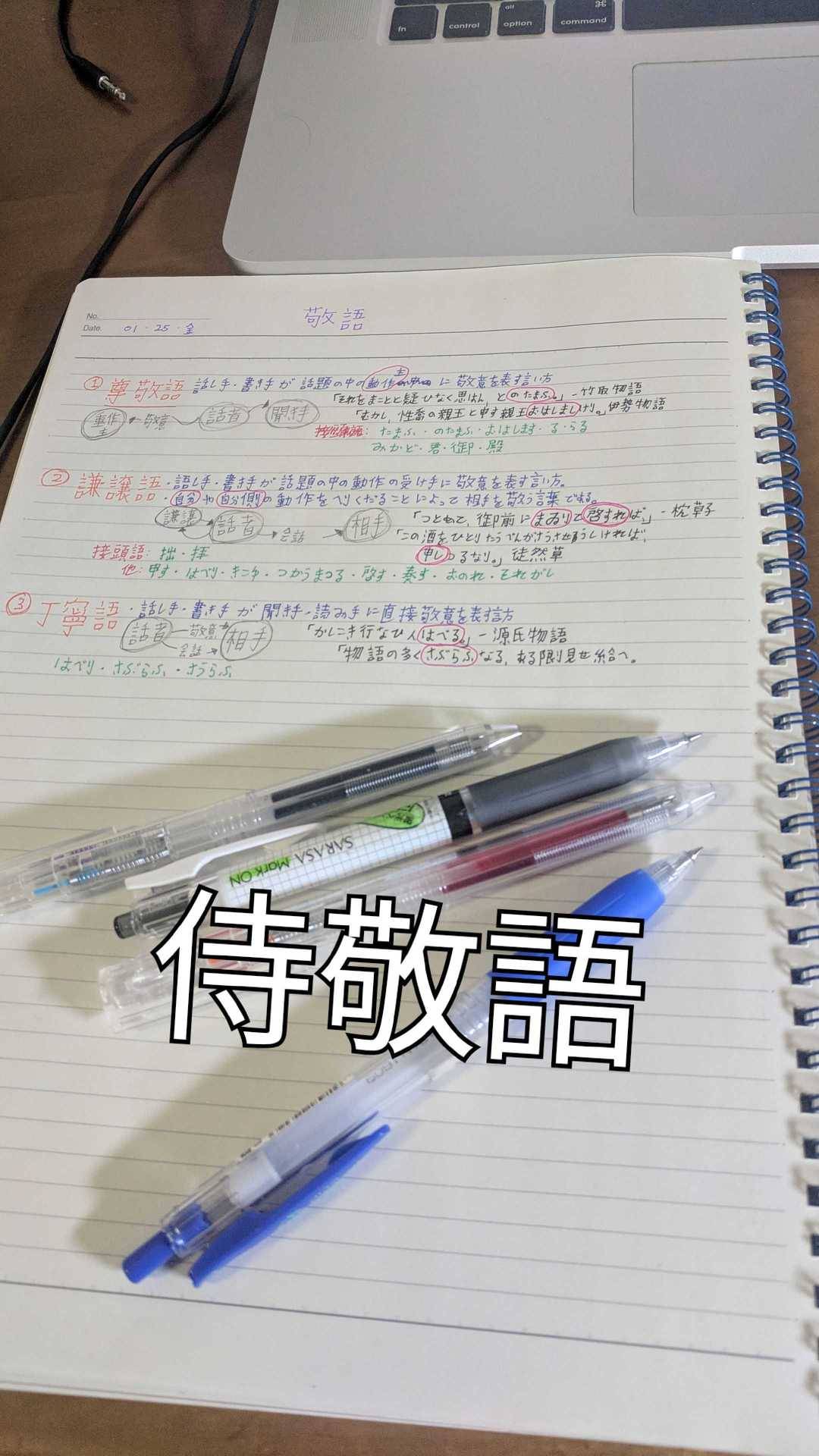
2019/01/25
Whenever I’m in classical Japanese class I always wonder why I bothered taking it but when old Japanese men tell me how cool I am, that’s how I know it’s all worth it.
古文授業中にいつも取らんかったらいいなって思うねんけど、おじいさんたちが偉いなって言ってくれたらすっごい喜ぶ!
How I learned Japanese - Speaking
I’d like to briefly explain how I got to a point where I can take Japanese university classes in Japanese without too much of a language issue.
This post will be about speaking, probably the most fun and rewarding part of learning a language is when you don’t realise you’ve been speaking a language you weren’t raised into. Questions are always welcome! 愚問がない!
Speaking
Actually speaking Japanese is the best way to learn how to speak Japanese. If you don’t live in Japan it might be more difficult but even back in my hometown I was able to find friends and people to talk with though language swap, tutoring and so forth. I had the most success with “HelloTalk” and even after not using it for over a year, I still talk with the friends I made there. Mimic what and how Japanese people say things and step out of your comfort zone
Pronunciation
I can’t stress how important it is to learn proper pronunciation. You will feel so much better about speaking if you know how to say what you’re saying. Knowing proper pitch accent is made all the more important with Japanese since there are so many homonyms in Japanese. Pretty much every Japanese learner at some point said something the wrong way and the message got lost entirely. The best resource that I’ve found in terms of practicality is made by “Dogen”.
Just today I said the word 意外 but with the pronunciation of 以外 and had I not known that pitch accent exists, I would not have been able to quickly correct myself
I highly recommend recording yourself speaking and listening to it back, if you immediately cringe at hearing yourself, do it more. I’m know that people hating the sound of their own voice is a real thing but, getting used to hearing yourself talk and identifying things that sound very non-Japanese-like and improving on them will get you so far. Pleaserecordyourself.
A Few Thoughts on Speaking
Japanese learners are notorious for their ability to read and write but not being able to put a sentence together when speaking. And then when we do speak, it sounds like we’re reading off a script. Speaking isn’t tested in the JLPT which is probably a big reason that not many people learn it. Please learn how to converse in Japanese
When I first started learning Japanese, I would go to conversation class and feel that some days my Japanese game was right on, and some days my game was way off. I’d start class feeling pretty good, but after a while, I would have a harder and harder time understanding so that by the end of class, I’d leave feeling completely overwhelmed and thinking I was never going to get the hang of this.
Things were like this for a long while. I’d feel like I really got the hang of something one week, but then the next week I’d find that I had mixed something else up completely and was back at square one when it came to the conversations.
I started pre-studying, reviewing the next lesson prior to class so I’d have at least half a clue during class. For the most part, this worked out great and I had a much better grasp on things, but then I’d run up against a bunch of vocabulary that I didn’t have time to review and would have to ask sensei to please explain just about every other word.
Since finally getting Lolli into hoikuen (daycare) twice a week and signing up for the JLPT N4 test in December, I’m making a much more concentrated effort to study and I feel like it really shows. I get to study for a few hours in the afternoon twice a week and I focus the studying on vocabulary, kanji writing/reading, and verb conjugations geared towards the test.
The vocabulary is always the most important to me. I find that I know how to create the basic sentence structure, but I just don’t know the right word to use. When I used to take French in high school, my teacher always said that my weakness was my limited vocabulary, but my strength was being able to explain what I needed using that limited vocabulary. I find myself doing this in Japanese all the time, which makes for quite awkward conversations sometimes!
It’s always so embarrassing when sensei compliments me on Japanese skill because I still feel like I’m floundering most of the time. There are plenty of times when I need to ask for help or just resort to checking my dictionary instead.
But at least, it seems like those times are happening less often than it was at the very beginning. If I can understand half of the conversation, I feel like I really got somewhere.
Ha.
今週末大阪に行きます。待ちきれますん!たこ焼きやお好み焼き等食べたいですよ。街をぶらぶら歩いて写真を撮ろうと思っています。
おすすめがあったら、教えて下さい!
This weekend, we are going to Osaka. I can’t wait! I want to eat takoyaki, okonomiyaki, and other foods. I plan to walk aimlessly and take photos.
If you have recommendations, please tell me!

ベッドで小説を読んでいますー。今のところはすごく面白いので読み耽ります!!何ページをめくったか分からなくなるぐらい面白くて読みふけっちゃいますww。この小説のタイトルはかがみの孤城なんです。まだ読んでるけど是非読んでくださいね。読みやすくてキャラクタたちは面白いだと思います。さらに主人公の過去は悲しいですよ(´Д⊂ヽ。他のキャラクタの学校へ行かない理由と過去を知りたいだから読み続けます。
午前1時31分
間違えがあったら教えて下さい!修正してくれた方にいつもありがとうございます




文法の勉強〜!「にわたって」と「からして」っていうの文法はちょっと分からなかった少し練習して度々会話で使ったら分かるようになると思いますねぇ。
Grammmaaaaaaaaarrrrrrr. Got a little confused on the にわたって and からして but now I kinda get the gist. Just need to review it and to use it more often.

アマゾンで購入した本がやっと届きて読むのが待ちきれない〜。
The things I bought finally came ʕ•ٹ•ʔ. Can’t wait to read both of them. Especially the art book


Was checking bookstore if they added anymore new japanese books but seems like not much has changed. Though I was interested in the 日本語表現練習帳 book. That aside, today was really nice. only around an 1hr of school, went home with my friend then went out again to the bookstore.
How’s everyone been doing? Any progress in TL or life?


N2文法を勉強し始めました!
The beginning of N2 grammar


漢字


こんばんわー!
今日は絵を描くやる気が出てきたからいくつかの絵を描いてみました

これは勉強の日課です。勉強をしていたらこのアプリで勉強時間を登録します。Flip studyというアプリです
小説を読むこと: 15m
文法と漢字: 1hr
心理学: 30m
単語: 20m
This is my study routine. If I’m studying, I input the amount of study time I’ve done.
Reading novels: 15m
Grammar + Kanji: 1hr
Psychology: 30m
Vocab: 20m
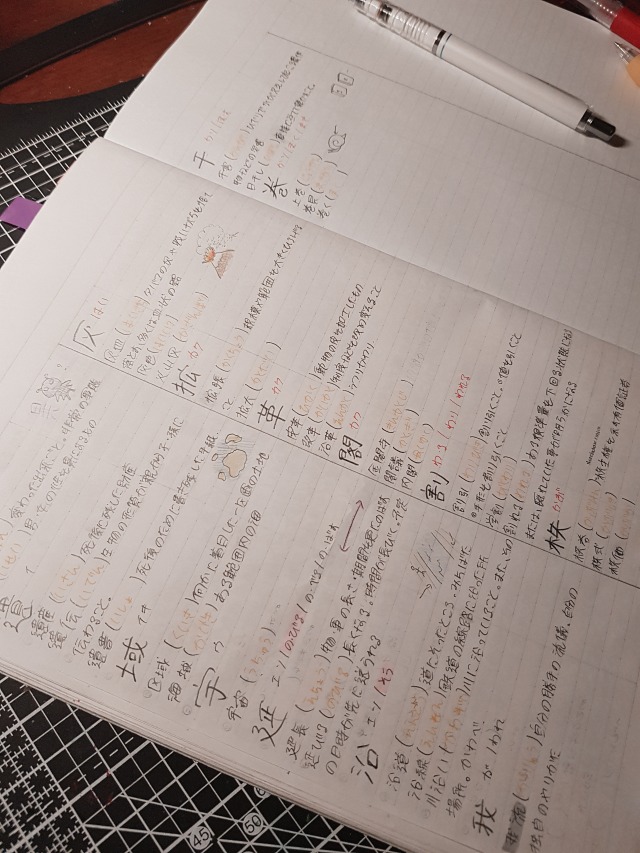
6年生の漢字を勉強し始めて思ったよりあまり難しくないから嬉しいです!でも、漢字を勉強すればするほど単語量が大きくなって毎日の復習はちょっと大変で圧倒させられます。これからも頑張ります!
I’ve just started doing 6th grade kanji and surprisingly it wasn’t that hard so . However, the more I study kanji the more vocab i have to learn so the review can be overwhelming.

ファニエスト外語学院というの番組が凄く面白すぎてハマってますww。腹が痛くなるほど笑いすぎましたぁぁ
この番組については日本語を学ぶ初心者が日本へ来て、日本の行儀とか文化などを習うなんです。でも日本語しか喋れませんw。
I’ve been addicted to a show called “The funniest language academy” since it’s so funny and interesting. I laughed so much my stomach hurt.
This shows basically about beginner/ amateur japanese learners that go to Japan and learn things like etiquette in places, culture or just do other fun things. But they can only speak in Japanese despite the lack of knowledge.
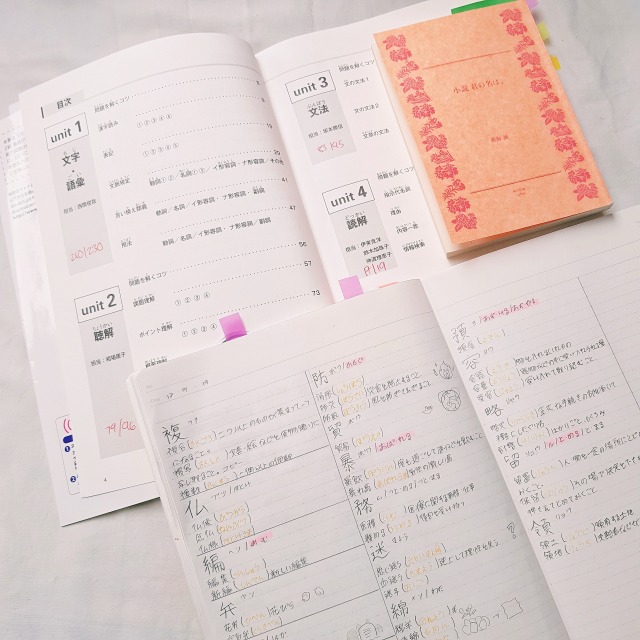
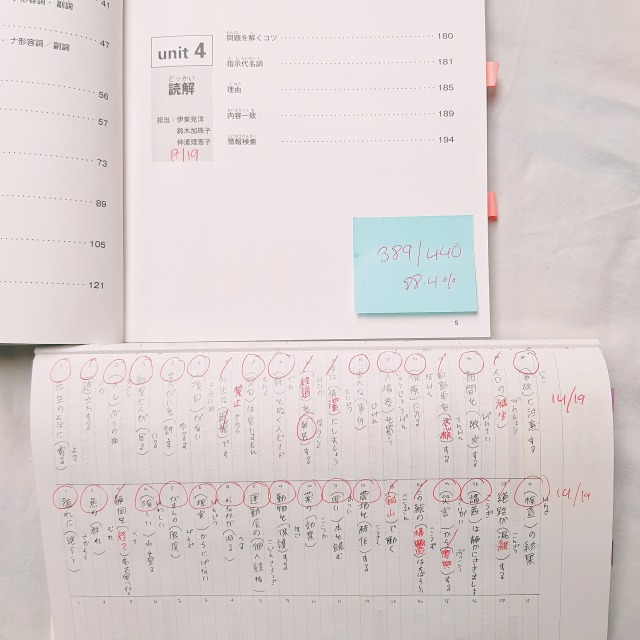
Recent things I’ve done: パターン別 book. Also finished 5th grade kanji so I’m doing mini tests for it (and others as a review). The kanji are getting harder to remember so i best be reviewing them everyday… hopefully aaaaaaaa Tbh i retained most of them by reading a lot instead of reviewing. It’s a good way but since not all come up in books i forget quite a few. That’s why i need to review em now rip
やっとパターン別というの教科書をし終えた!5年生の漢字も勉強をし終えたからクイズをするつもりです。3,4年生の漢字もクイズをやって復習しようかと思っています。漢字は段々に難しくなっているから毎日は復習しなければとならないと思います(泣)全然楽しみにしていませんww。
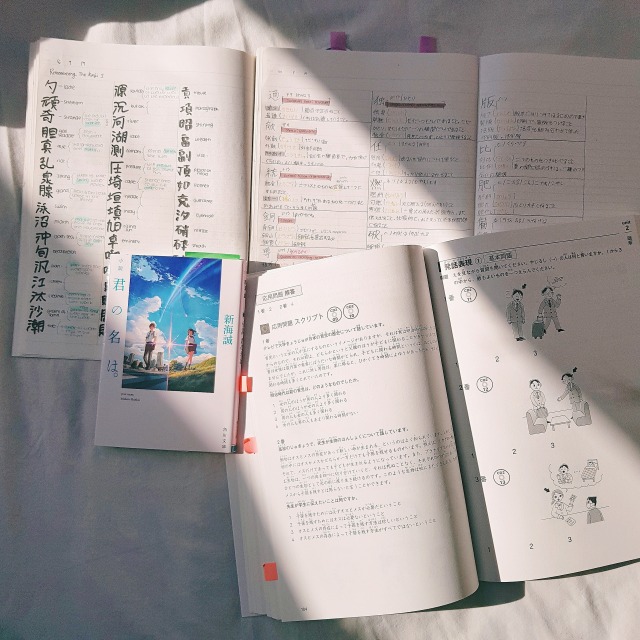

投稿するのを忘れちゃってごめんなさい!この間、漢字や読解を復習してちゃんと練習しました


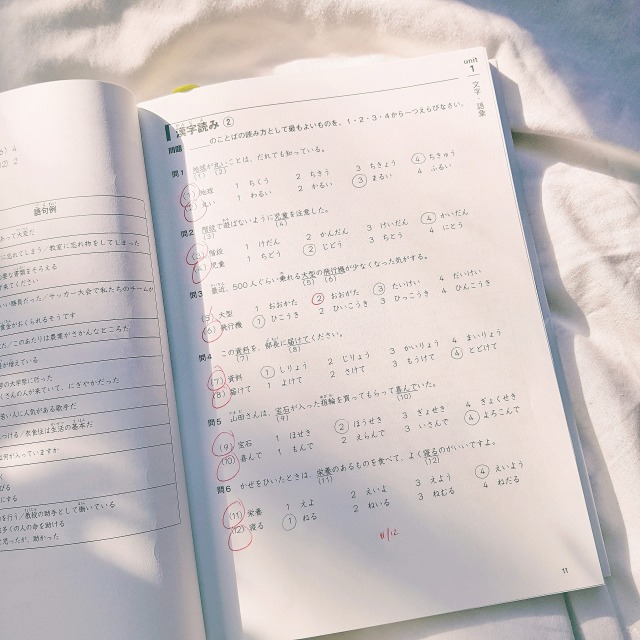
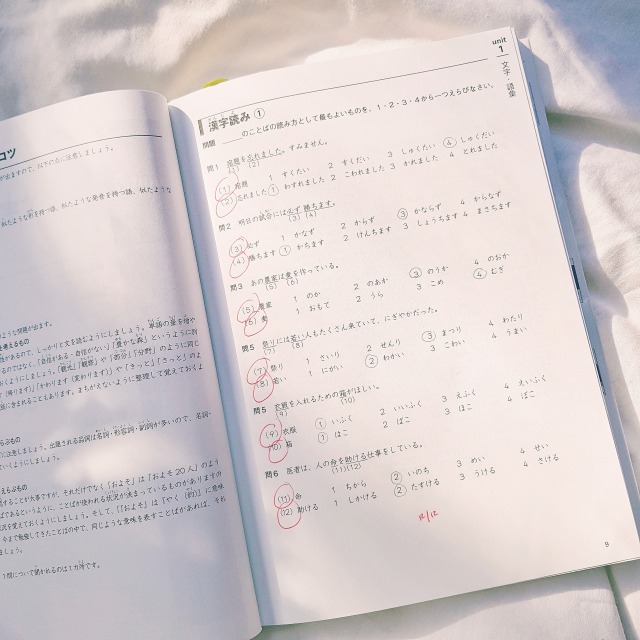
Helloooo~. My book finally arrived which means after I finish it and the question book of the same series, I’ll finally settle with N3 and move on. Though ofc other practice aside from that are put into place. In this book there’s a lot of questions and after a bunch of them there are minimised lessons regarding it. thick book (i like) so yeahhh not going to finish too quickly.
As for 三日間の幸福 (novel which i finally finished) it was indeed difficult in terms of vocab and kanji but everything else was fine for me. I took a lot of time on each page searching for words i didnt know/ couldnt read and putting it into anki. Butttt it was rewarding in the end. The bits I liked were the relationship build-up of クスノキ and ミヤギ, looking into their past, seeing what would happen between him and his childhood friend etc. Also the concept (of selling lifespan) was just interesting . Though there were parts I couldn’t understand properly, it was still a nice read. I would say that this is more appropriate for N2 and above students tho. unless youre like me who wants to drown in unknown vocab and kanji : D

漢字と文法の模擬試験を受けてみて間違い問題のことを復習しました!ちなみに、これはN3です。文法はまだまだらしく、これから毎日文法をもっと復習することにします。
模擬試験(もぎしけん)mock test
復習(ふくしゅう)review
漢字1:47/50
漢字2:47/50
文法:33/45
おひさしぶりですね [ ohisashiburi desune ] means “it’s been a long time!” But it sounds very polite!
If you use it to your friends, they will feel the distance between you both!
So I recommend you to say ひさしぶり [ hisashiburi ] or ひさびさ [ hisabisa ] to your friends! These are casual ways to say “It’s been a while!” and sound friendly!
I hope it’s useful for you!☺️
Thank you for learning Japanese!!
have a wonderful day☕️
Layla
Bite size Japanese
How to count from 1 ~ 100 in Japanese?☺️









These are the 7 basic Japanese words that you say differently if you want to sound more #casual and #natural! ☺️
TIMESTAMPS
00:00 Intro : How to sound more casual when you speak Japanese?
00:30 ①いいえ→いや
01:25 ②とても→ほんとに
02:16 ③たくさん→すごい
03:32 ④ごめんなさい→ごめん
04:42 ⑤そして→あと/それに
05:51 ⑥てform+います→てform +ます
06:14 ⑦ますform+ませんか?→ないform?
07:41 Concluding


